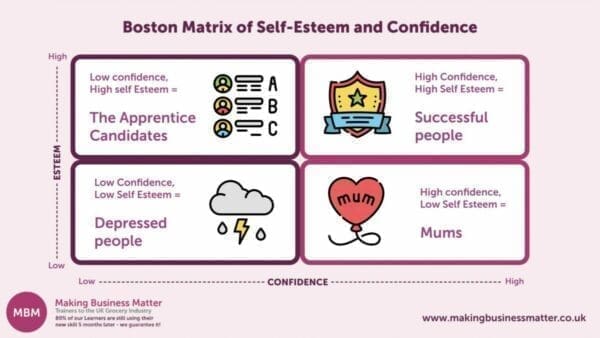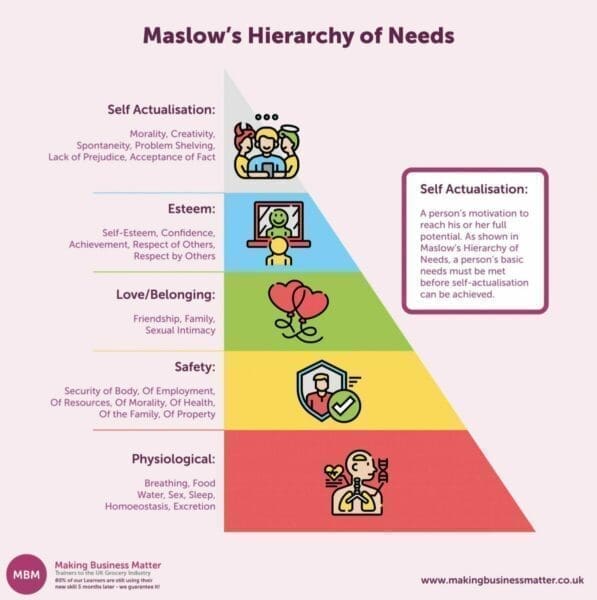What is Self Esteem?
In simple terms, it is the opinion we have of ourselves. Psychologically self-esteem is denoted to describe one’s own subjective evaluation of their personal worth or value. It can be simplified to how much you like yourself, despite any external circumstances.
Your self-esteem is defined by many factors:
- Self-confidence.
- Sense of security/belonging.
- Identity.
- Feeling of competence.
Synonyms like ‘self-worth’ or ‘self-belief’, all relate to this notion of self-esteem.
‘Self-esteem tends to be lowest in childhood and increases during adolescence, as well as adulthood, eventually reaching a fairly stable and enduring level. This makes self-esteem similar to the stability of personality traits over time.’
As you mature and face the challenges that everyday life throws your way, you will notice your self-esteem changing and meeting the stability of your mindset.
It is important to note, however, too much/or/too little slef-esteem is not ideal. As circumscribed by

What is the Difference Between Self Esteem and Confidence?
Self-confidence is how confident you are in your skills, ability, and what you do. Whereas self-esteem is how you feel about yourself.
It is possible to have high self-confidence and at the same time, have low self-esteem. Yet unusual. Most people that have a low opinion of themselves (self-esteem) will also believe that they can achieve very little. Conversely, most people that have a high opinion of themselves, also believe that they can do things very well.
Yet, we’ve all seen people with great self-esteem that fail. The BBC’s TV Show ‘The Apprentice’ is a good example of where those people exist.

How Can You Build and Improve Self-Esteem?
I am obliged to mention that days when we lack self-esteem, lack motivation, and lack pretty much everything we need to function like we ‘usually do’; these days are completely natural. Life will not always be a breeze and one thing is guaranteed you will have your off days. However, whilst these anomalous days are entirely natural, it becomes problematic where you lack self-esteem in the long term. Months, where you don’t feel right, can have a huge impact on your mental health and life.
Low self-esteem, is when your opinion of yourself is negative, you view everything critically and cannot bring yourself to deal with the normalities of social intercourse. There is no need to worry, statistics like this: ‘50% mental health disorders are established by the age of 14, while 75% are established by age 24’, just illuminate how prevalent mental health challenges are in today’s climate and that you are not alone.
What are 10 Ways to Improve Self-Esteem?

See below for activities that can boost your self-esteem – tips for talking yourself up:
Sticky Learning ® is 7 times more effective than 1-day training courses. Plus, you will get a Chain of Evidence proving your Return on Investment. Discover soft skills training that changes behaviours long term.

1. Appreciate All that You Have Already Achieved
-
- Appreciate what you are good at and pursue those activities. Instead of telling ourselves what we are doing wrong, cannot do, or do badly, we need to, for our own well-being, tell ourselves some things that we do well. A shortlist in your head of things that you have achieved, done well, and/or proud of. For example:
- 1. ‘I have two great kids that are upstanding, hard-working, and kind to others.’
- 2. ‘I have been married 20 years and we are still together, happy, and support each other’.
- 3. ‘I have built a support network of friends and family that love me and will always help me’.
2. More Positive Relationship Time
Focus on honing your positive relationships. As well as creating distance to less useful and loving relationships. Find ways to see or speak to family and friends that listen, and will support you, and make excuses to those that do not. Positivity and support will breed positivity and support.
3. Treat Yourself as You Would Your Best Friend
Be kind to yourself. Would you expect your best friend to work 70 hours per week, and allow him to beat himself up about what he has not achieved? No, then treat yourself as well as you would your best friend – this is a good rule of thumb to live by. If you would not say it to him, do not say it to yourself. Make this your rule to be kind to you.
4. Start Saying ‘No’
Start saying no to things you don’t want. This might be a party that you really don’t want to go to or lunch with a friend that wants to share their problems. If you don’t have the mental well-being to do so then you don’t have the mental well-being to do so. Accept that it is how it is right now and you’ll find a way to support them once you have supported and looked after yourself.
5. Small New Things can Make a Big Difference
Challenge yourself. Easy to say, and hard to do. ‘Challenge’ has become a word that is synonymous with feedback or doing something we don’t want to do. Putting challenge more positively…find a way to be kinder to you. An early morning walk 3 times per week, finish early on a Friday, or lunch out one day a month. Small things that you know to be kind to you can make a big difference.
6. That Little Voice in Your Head
It can be such a cruel master. Telling us that we are good enough, that we keep getting stuff wrong, or that we shouldn’t even try, reminding us of when we last did it wrong. Betaing us up and especially at a time when we need to be kind to ourselves.
Be aware of this little, yet powerful voice. What does it keep saying to you? If you were a coach, let’s say of Usain Bolt, would you let the coach talk to you that way? No way, you’d fire him. Do the same – Fire him.
Jack Black of the Scottish mental fitness programme ‘Minsdtore’ describes the voices in our head like our tapes that ran computers. Tapes going round programming the computer. If the programme was faulty they would ‘delete that programme’ – Not a bad idea. When you hear the voice, say to yourself, ‘Delete that programme’.
7. Accept Who You Are
We have a habit of comparing ourselves to others. They have a better house, better job, better car better partner, better children, and so on. And they may have. They may also not have been dealt the life cards that you have. You are a sum of the decision you have made to this point and you are doing well. Stop comparing, accept who you are, and start living.
8. Move Your Body
Exercise can conjure up those ripped bodies spending hours in the gym. That’s not us, and we don’t need to go from 0 to 100 miles per hour. Start small with something that you can do frequently until it becomes a habit, and don’t increase it until it is absolutely habitual. It might be a walk 2 times per week at lunch, one run once a week for 20-minutes. Don’t compare yourself to others. Just do something that gets your body moving, and only build once you have it licked!
9. Perfectionism is Impossible – Make Mistakes
I’d rather make mistakes as a reminder that I am moving forward than never make a mistake and stay where I am. Mistakes are natural. They happen. And if you are not making them then life would be rather dull. No risks, no trying stuff, no experiencing something different. It’s all part of life. Better to have tried and failed, than never to have tried.
10. Live on the Peak, Not in the Valley
‘Peaks and Valleys’ is a great book by Spencer Johnson. He challenges us to live on the peaks longer and to get out of the valleys quicker. Especially when you are low the peaks are hard to come by and the valleys are rife. Try to stay on the peak as long as you can by celebrating the small stuff, and get out of the valleys quickly by looking for the next thing to be grateful for, or to celebrate. No matter how small.

Why is Self-Esteem Important?
This notion of self-esteem doesn’t live in the abstract. Instead, it affects the decisions you make, the relationships you are in, your emotional and overall well-being. Additionally, it can affect motivation. Someone with a positive view of themselves will feel more inspired to pursue their aspirations. On the contrary, those with a negative view of themselves will feel less encouraged to do anything, let alone pursue additional goals and aspirations.
People with overly high self-esteem can also be problematic. They may feel entitled to succeed without having any real practical skills to back up this delusion. Therefore it is important to understand self-esteem, so you can decide how is best to approach your own life.
Try to find a balance, learn to believe in, and trust yourself. Nobody wants to live a life of anxiety and misery, neither do we want to become deluded with thoughts of unnatural success. Listen to your body and make appropriate changes to your lifestyle where necessary.

TED Talks: Resources to Further Your Understanding of Self Esteem
Amy Adkins: 3 tips to Boost Your Confidence
Many of us recognise the value of improving our feelings of self-worth. When our self-esteem is higher, we not only feel better about ourselves, we are more resilient as well.
Brain scan studies demonstrate that when our self-esteem is higher, we are likely to experience common emotional wounds such as rejection and failure as less painful, and bounce back from them more quickly. When our self-esteem is higher, we are also less vulnerable to anxiety; we release less cortisol into our bloodstream when under stress, and it is less likely to linger in our system but as wonderful as it is to have higher self-esteem, it turns out that improving it is no easy task. Despite the endless array of articles, programs, and products promising to enhance our self-esteem, the reality is that many of them do not work and some are even likely to make us feel worse.’
Guy Winch: 7 Ways to Practice Emotional First Aid
‘You put a bandage on a cut or take antibiotics to treat an infection, right? No questions asked. In fact, questions would be asked if you didn’t apply first aid when necessary. So why isn’t the same true of our mental health? We are expected to just “get over” psychological wounds — when as anyone who’s ever ruminated over rejection or agonized over a failure knows only too well, emotional injuries can be just as crippling as physical ones. We need to learn how to practice emotional first aid. Here are 7 ways to do so…’
Self-Confidence
The idea of self-confidence fits nicely into this discussion. Like the latter, having self-confidence denotes having trust in your own judgement, skill, and qualities. It is important to be confident in oneself, without it you will fundamentally fail to identify your strengths, pursue your passions or recognise your weaknesses.




